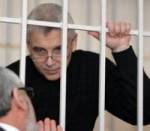• Topics / Politics and human rights
• Topics / The right to a fair trial
Ivashchenko: Only lawful court ruling would be to terminate the case for lack of a crime

Former Acting Defence Minister in Yulia Tymoshenko’s government, Valery Ivashchenko has given Liga.net an “interview” by sending his answers in writing from the SIZO [remand prison] where he has been held since August 2010.
Ivashchenko is adamant that there are no grounds for holding him in custody, and that the Pechersky District Court in Kyiv is not guided either by considerations of justice or of humanity.
Valery Ivashchenko was arrested on 21 August 2010. Since that time his lawyers have made ten applications at least for the restraint measure against him to be changed, but all have been rejected. The arguments for releasing him have included deterioration in his health – these have been ignored. Valery Ivashchenko’s case is one of four examined in the Second Preliminary Report by the Danish Helsinki Committee on Human Rights,
The Prosecutor General accuses him of unlawfully taking a decision to sell the property of the Feodosia Marine Engineering Works which was property of the Ministry of Defence. The Prosecutor claims that a considerable part of the assets of the enterprise went into private hands.
Ivashchenko states that he is charged with something he had no relation to, with involvement in the sale of the Feodosia Marine Engineering Works property.
“The Prosecutor General’s investigators saw fit to give a more than free, or more accurately, unlawful interpretation of my agreeing the draft plan for the reorganization of this enterprise as being the issue by the Defence Ministry of permission to sell the enterprise’s property.
In the first place, according to the Law on reinstating the solvency of a debtor or declaring them bankrupt, the only consequence of the Ministry’s agreeing a draft reorganization plan is the possibility of its being examined by a committee of creditors. It is only after approval by the committee of creditors that the possibility arises of presenting the draft plan to an economic court for its approval. It is the court’s approval of the reorganization plan that constitutes a legal act enabling later sale.
Secondly, in agreeing the draft plan an addition was added to the text on p. 58 which if the need arose to dispose of and sell any of the factory’s property obliged those carrying out this procedure (in the given case the director of the reorganization) to seek permission for the disposal and sale from the Defence Ministry as the body in charge of the property.”
Ivashchenko goes on to stress that the director of the reorganization did not do this. This, he assumes, is the unlawful action which the former director Mikheyev has said he was guilty of.
He has no intention of admitting any guilt in what he calls a trumped-up case.
Mr Ivashchenko was asked about the figure for the State’s supposed losses mentioned “first 17 million UAH, now 70 million UAH. What in your opinion did the State lose from this sale of property?”
“The so-called loss thought-up was not such since virtually all the unlawfully sold property was returned by a court order to the State, and in the civil suit on compensating loss to the factory the figure of 88 thousand UAH is mentioned.”
He was asked whether he sees his prosecution as like those of Tymoshenko and Lutsenko “who are called political prisoners”, and if so what are those in power trying to achieve. If not, and the prosecution was commissioned, who by?
He responded that “influential people” were implicated in his prosecution, the same ones whose removal from the Defence Ministry he devoted serious efforts to achieve in 2009. “When a new team came to power, those individuals used their personal connections in the Prosecutor General’s Office and the appropriate moment – the declared fight against corruption at the highest level.” He asserts that the Prosecutor General’s Office and SBU [Security Service] then got the command to go for him and manufacture criminal proceedings.
He says that there were hints from representatives of the Prosecutor General’s Office that he should at least partially admit guilt. He is adamant that he will do nothing of the kind to “help the swine who from start to finish fabricated a case against me “save face”.
Valery Ivashchenko says that his witnesses have yet to be questioned, and that even the prosecution’s witnesses have not confirmed the charges against him. He says, on the contrary, some in court retracted testimony given during the pre-trial investigation, he says because of pressure from the investigators.
He does not believe that the adjournment of hearings until 1 March is solely for reasons of his health, but does not know why.
He does not consider the trial to be fair and has on many occasions addressed such criticism at the judges: Serhiy Vovk; O. Tsarevych and V. Karabanya. He has also lodged a complaint to the High Qualification Commission of Judges regarding these judges.
The only lawful court ruling, he believes, is that terminating the prosecution for lack of elements of a crime.
His application to the European Court of Human Rights was lodged in June 2011.





